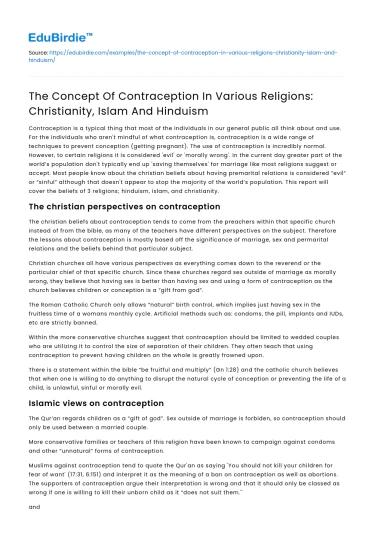Table of contents
- The christian perspectives on contraception
- Islamic views on contraception
- Hindu belief
Contraception is a typical thing that most of the individuals in our general public all think about and use. For the individuals who aren't mindful of what contraception is, contraception is a wide range of techniques to prevent conception (getting pregnant). The use of contraception is incredibly normal. However, to certain religions it is considered 'evil' or 'morally wrong'. In the current day greater part of the world’s population don't typically end up 'saving themselves' for marriage like most religions suggest or accept. Most people know about the christian beliefs about having premarital relations is considered “evil” or “sinful” although that doesn't appear to stop the majority of the world’s population. This report will cover the beliefs of 3 religions; hinduism, islam, and christianity.
The christian perspectives on contraception
The christian beliefs about contraception tends to come from the preachers within that specific church instead of from the bible, as many of the teachers have different perspectives on the subject. Therefore the lessons about contraception is mostly based off the significance of marriage, sex and permarital relations and the beliefs behind that particular subject.
Christian churches all have various perspectives as everything comes down to the reverend or the particular chief of that specific church. Since these churches regard sex outside of marriage as morally wrong, they believe that having sex is better than having sex and using a form of contraception as the church believes children or conception is a “gift from god”.
The Roman Catholic Church only allows “natural” birth control, which implies just having sex in the fruitless time of a womans monthly cycle. Artificial methods such as: condoms, the pill, implants and IUDs, etc are strictly banned.
Within the more conservative churches suggest that contraception should be limited to wedded couples who are utilizing it to control the size of separation of their children. They often teach that using contraception to prevent having children on the whole is greatly frowned upon.
There is a statement within the bible “be fruitful and multiply” (Gn 1:28) and the catholic church believes that when one is willing to do anything to disrupt the natural cycle of conception or preventing the life of a child, is unlawful, sinful or morally evil.
Islamic views on contraception
The Qur’an regards children as a “gift of god”. Sex outside of marriage is forbiden, so contraception should only be used between a married couple.
More conservative families or teachers of this religion have been known to campaign against condoms and other “unnatural” forms of contraception.
Muslims against contraception tend to quote the Qur'an as saying 'You should not kill your children for fear of want' (17:31, 6:151) and interpret it as the meaning of a ban on contraception as well as abortions. The supporters of contraception argue their interpretation is wrong and that it should only be classed as wrong if one is willing to kill their unborn child as it “does not suit them.''
and translate it as the significance of a restriction on contraception just as premature births.
The Prophet as portrayed the withdrawal strategy (azl) as 'ethically adequate' in the correct conditions.
Egyptian scholars referred azl as (preventing conception) satisfactory as long as it doesn't have a long haul impact. Contraception with a childless marriage is disapproved. therefore the idea of sterilisation is deemed wrong, the Qur'an states that men are not permitted to castrate themselves. natural family planning was accepteded during the reign of the prophet Muhammad. But the other methods are not acceptable In spite of the fact that Muslims believe that having sexual relations should only be under wedlock, although is is possible to become exposed sexually-transmitted diseases; condoms are the main contraception choice to prevent STI's.
Hindu belief
Hinduism encourages to only have sexual relations inside marriage and doesn't fully agree with the usage of contraception that will prevent children forever. Hindus accept the duty of having a family within a certain time in a person’s life and understands that spacing of children is a very important thing. There is nothing inside the hindu religion that says anything against contraception as long it is used between wedded couples and is simply used for the spacing of children.
The idea of contraception varies between scholars; Gandhi supported restraint as a strategy, which is basically not functional for most couples. Radhakrishnan (an Indian philosopher) and Tagore (well known current indian writer) all appeared to encourage artificial strategies instead of being against them. The Dharma (strict and moral codes of Hindus) emphasise the need to act for the good of the world. This makes a few Hindus believe that they should only have the amount of children that the environment around them can provide for as that can sometimes conflict with the Hindu code. Fertility is important to everyone no-matter what religion, but having more children than that particular family can support is thought to be violating the Ahimsa (nonviolent rule of conduct) so contraception is not something Hindus frown upon as they not only have substantial views on society, they also have views on population and economy.
Contraception beliefs differ in each religion. Some religions deem contraception unacceptable. Through the 3 religions studied within this text they all have similar views in common; must only be used between married couples, should not be used to prevent children altogether and preferably recommends a natural form is used at all. These views are understandable and do not come across as unfair, although they are not really how people think today. These views do not come across as if they’re a law, but they are just a belief pathway and how some religions prefer to live their lives.






 Stuck on your essay?
Stuck on your essay?

